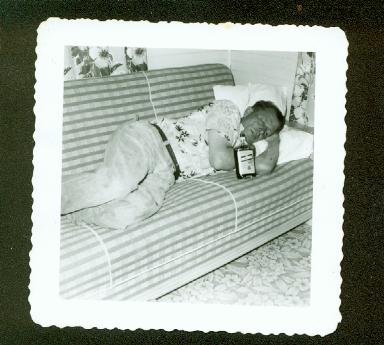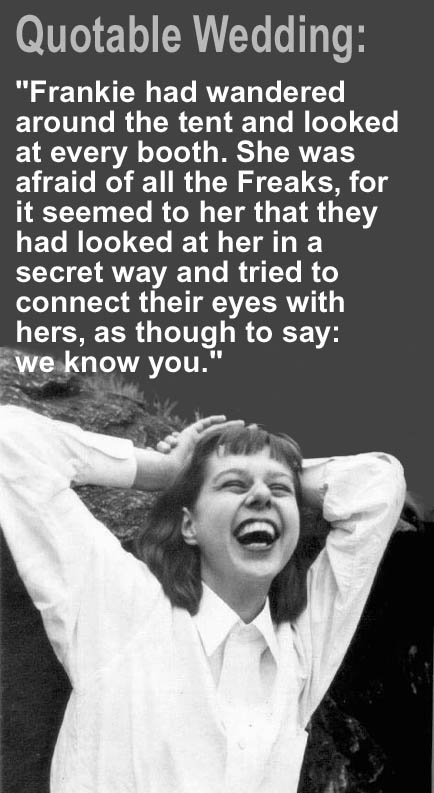Schwarz
View current page
...more recent posts
Then she suggested I check out the reasons why Warhol loves America so much, because he was in love with his country’s democracy, and saw no difference between a still-life painting of a bowl of fruit and 8,000 identical silkscreen prints of canned tomato soup. In America, the infinitely reproducible is better respected than the one-off. Mass appeal is more important than masterworks. Warhol said, “What’s great about this country is that America started the tradition where the richest consumers buy essentially the same things as the poorest. You can be watching TV and see Coca-Cola, and you can know that the President drinks Coke, Liz Taylor drinks Coke, and just think, you can drink Coke too. A Coke is a Coke and no amount of money can get you a better Coke than the one the bum on the corner is drinking. All the Cokes are the same and all the Cokes are good. Liz Taylor knows it, the President knows it, the bum knows it, and you know it.”
Of course, not everything in America is made of Coke. Warhol knows this. “When I was dying,” he said, recalling his stay in hospital recuperating from being shot by Valerie Solanas in 1968, “I had to write my name on a check.” As a comment on democratic materialism, Warhol named his studio The Factory and said, “I don’t understand anything but GREEN BIILS.” His subject was supply and demand so there couldn’t be just one masterpiece, there had to be 8,000. And great business is to be had in the art world if you’ve got an eye for what people desire. Because there’s always the matter of some great synchronicity when it comes to desire, and more than just money goes toward true love. You crush on art when you least expect it. Around the next corner, a piece of art is going to change your life. There’s never a choice in the matter.
Art isn’t democratic. It exists outside that sphere completely. Art is the only god you can prove exists. Everything else is mortal. The filmmaker Pier Palo Passolini called poetry “inconsumable,” and Warhol’s art, although it is about consumption, is forever inconsumable. And his book From A to B is inconsumable, too, because it is poetry, a very pure form of art, at once private while invariably connecting us to one another, as if by a lovely fluke
In several dozen nondescript office buildings around the world, thousands of hourly workers bend over table-top scanners and haul dusty books into high-tech scanning booths. They are assembling the universal library page by page.
The dream is an old one: to have in one place all knowledge, past and present. All books, all documents, all conceptual works, in all languages. It is a familiar hope, in part because long ago we briefly built such a library. The great library at Alexandria, constructed around 300 B.C., was designed to hold all the scrolls circulating in the known world. At one time or another, the library held about half a million scrolls, estimated to have been between 30 and 70 percent of all books in existence then. But even before this great library was lost, the moment when all knowledge could be housed in a single building had passed. Since then, the constant expansion of information has overwhelmed our capacity to contain it. For 2,000 years, the universal library, together with other perennial longings like invisibility cloaks, antigravity shoes and paperless offices, has been a mythical dream that kept receding further into the infinite future.
Until now. When Google announced in December 2004 that it would digitally scan the books of five major research libraries to make their contents searchable, the promise of a universal library was resurrected. Indeed, the explosive rise of the Web, going from nothing to everything in one decade, has encouraged us to believe in the impossible again. Might the long-heralded great library of all knowledge really be within our grasp?
Brewster Kahle, an archivist overseeing another scanning project, says that the universal library is now within reach. "This is our chance to one-up the Greeks!" he shouts. "It is really possible with the technology of today, not tomorrow. We can provide all the works of humankind to all the people of the world. It will be an achievement remembered for all time, like putting a man on the moon." And unlike the libraries of old, which were restricted to the elite, this library would be truly democratic, offering every book to every person.
But the technology that will bring us a planetary source of all written material will also, in the same gesture, transform the nature of what we now call the book and the libraries that hold them. The universal library and its "books" will be unlike any library or books we have known. Pushing us rapidly toward that Eden of everything, and away from the paradigm of the physical paper tome, is the hot technology of the search engine.
continue reading
ken johnson for the new york times sets his critical sites on appropriation art.
are any of us safe?
here we are reminded that irony was suspended shortly after 9/11. i contend that that suspension lasted through the 2004 elections and only returned in a significant way via colberts wh press diner appearance. i think katrina was a crack in the magicians mirror we know as the bush and co parallel universe. the cheney hunting event was a little peak behind the curtain too. a society needs irony to self regulate. some things can only be spoken first through humor. then we start to get comfortable with the truth again and with that a return to normalage. i find the term bush "bubble" a misnomer or at least an severe understatement. thats why this story is so significant and a watershed event for me. for the first time in a long while i sense weve turned the corner in accepting/not accepting the whole bush co alternate universe routine. god bless andy breckman too, i think he missed the irony memo altogether.
"Soon after Sept. 11, Graydon Carter, editor of Vanity Fair, announced that we had reached the "end of the age of irony." The comment was particularly odd since Carter was one of the co-founders of Spy, the often brilliant and irony-rich satirical magazine of the 1980s.
[....]
Why did the media so uniformly ignore Colbert? For one thing, his performance as a Republican-licking pundit held a mirror up to the media's sycophancy as much as it criticized Bush. So, by ignoring the criticism of them, the media whores performed in just the way Colbert described their reporting of, say, the period before the Iraq invasion. They ignored reality -- it has a liberal bias, Colbert observed -- and slavishly licked Bush's ass clean.
Of course, many in the media, as well as the conservative robots on the Internet, produced their own reason for not reporting Colbert's shtick. It simply wasn't funny, they said. Well, of course it isn't too funny if your own idiocy was being reflected.
That again comes back to the question of satire's function. It isn't meant to produce slapstick laughs. It is meant to make people think about the absurdity in which they are participating. In fact, satire assumes, and usually demonstrates, that its object is capable of behaving differently."

...the truly important issue isn't whether one found it funny or not. Humor is subjective, thank god. Obviously I and a lot of other people found it funny. But laughter is an involuntary physical reaction and there's no way to create such a reaction through subsequent argumentation. Dissection kills the joke---unless you're Andy Breckman (or Colbert, for that matter) and you work on a meta-level where the agonizing death of the joke is the meta-joke.fatherflot
...
My problem is the attempt by the so-called "liberal media" to make the incident disappear down the memory hole, compounded by the faulty logic which claimed that since the objects of the satire were made uncomfortable rather than amused, it was ipso facto not funny and therefore not worthy of mention in stories specifically dedicated to the night's events.
Whether one found it funny or not is immmaterial to the fact that despite the efforts of the mainstream media to kill the story, it has become one of the defining moments of the most secretive, imperial, and stage-managed presidency in US history. Colbert got inside the bubble and made The Decider squirm----and millions of people around the world felt like the message he delivered ("we're onto your fathomless bullshit and we have nothing but contempt for you and those who keep you comfortable") was their own.
gas tank bass
via zars
(Hail Freedonia!) deconstructing colbert

But ignoring a newsworthy keynote speech -- at an event the press corps itself set up -- doesn't go unnoticed anymore. Internet stables for liberals, like the behemoth dailykos.com, began rumbling as soon as the correspondents' dinner was reported in the mainstream press, with scant word of Colbert's combustive address.doug elfman chicago sun-times
This is trouble for the media. It has been losing customers to bloggers and Web sites for years. This won't help. The media's implosion of silence could be one of the final reasons many liberals use to not turn on TV news. It's not like they feel a vested interest in the industry anyway, since it has been bought and parceled by conservatives.
There is Rupert Murdoch's Fox News, that Pravda of GOP propaganda and breeding ground for Bush appointees. There are the networks' Sunday news shows that give more face time to Republicans. There are cable news channels like MSNBC, where Republicans have programmed the shows and hired on-air Republicans and conservatives-lite, from Tucker Carlson to Joe Scarborough and Chris Matthews. Some TV watchdogs even chronicle these conservative media daily, backed up by transcripts and video clips from TV news shows, in the expansive Web site, MediaMatters.com.
On cable, only CNN still plays the journalism-school middle ground most of the time, questioning liberals, moderates and conservatives with equal skepticism and respect. Clearly, in terms of advertising revenue, CNN alone cares to attract the disposable income of American viewers of all political stripes.
To liberals, this must be somewhat puzzling, since the rest of the conservative media primarily sides with a president whose approval ratings stand at 32 percent, a whisker better than Nixon's before he resigned in disgrace.
Liberals find true solace on TV only in the fake news of Comedy Central's "The Colbert Report" and "The Daily Show," a place where Jon Stewart merely has to show actual clips of Bush speaking, or Condi Rice, or Cheney, or Donald Rumsfeld to elicit laughter at their hubris. If NBC News let in audiences during its broadcasts, those people might also laugh at the president.
But the TV news corps, the unthinking and unblinking herd of pack journalists, prefer to laugh with the president, and kiss many viewers goodbye.
the folkston funnel / train watching location
art school confidential
D pressed
Obviously, Colbert is not the first ironic warrior to train his sights on the powerful. What the insurgent culture jammers at Adbusters did for Madison Avenue, and the Barbie Liberation Organization did for children's toys, and Seinfeld did for the sitcom, and the Onion did for the small-town newspaper, Jon Stewart discovered he could do for television news. Now Colbert, Stewart's spawn, has taken on the right-wing message machine.
In the late 1960s, the Situationists in France called such ironic mockery "détournement," a word that roughly translates to "abduction" or "embezzlement." It was considered a revolutionary act, helping to channel the frustration of the Paris student riots of 1968. They co-opted and altered famous paintings, newspapers, books and documentary films, seeking subversive ideas in the found objects of popular culture. "Plagiarism is necessary," wrote Guy Debord, the famed Situationist, referring to his strategy of mockery and semiotic inversion. "Progress demands it. Staying close to an author's phrasing, plagiarism exploits his expressions, erases false ideas, replaces them with correct ideas."
White, House, Correspondents', Dinner, Colbert, Main, Stream, Media, BlackOut
email attn public editor / public@nytimes.com / heres mine :
Dear PE,
Sad to say, but its not hard to see why your paper wouldn't cover Stephen Colbert's stunning performance at the WH correspondents' diner. His biting remarks merely held our press and president to minimum standards of truth. But it is surprising that you instead publish E. Bumiller's transparently non-news story on the patently weak routine enacted by the president and his comedic stunt double. For you to propagate the resulting disinformation suggests that you have learned nothing from the Judy Miller debacle. This is a lie by omission and you know it. Please address this matter publicly or continue to lose credibility for the MSM.
Bill Schwarz
the 5th annual ponderosa stomp schedule
About The Mystic Knights of the Mau Mau and The Ponderosa Stomp
THE MYSTIC KNIGHTS OF THE MAU MAU
The Mystic Knights of the Mau Mau is a 501(c) 3 cultural organization dedicated to preserving and presenting the rich history of American roots music. Through festivals, special events, concerts and outreach activities featuring musical living legends, we honor influential artists and educate audiences about their massive contributions to American culture.
OUR MISSION
Our primary annual event, the internationally revered Ponderosa Stomp, exists to celebrate, pay tribute to, and teach the cultural significance of the unsung heroes and heroines of rock-n-roll, rhythm & blues and other forms of American roots music while they are still alive. The Stomp festival and its year-round activities provide both a voice and career revival to overlooked sidemen, session musicians and other influential pioneers whose contributions have shaped American culture for over 50 years.
PONDEROSA STOMP
The Ponderosa Stomp is an American roots music festival dedicated to recognizing the architects of rock-n-roll, blues, jazz, country, swamp pop, reggae and soul. Founded in New Orleans and produced by the non-profit Mystic Knights of the Mau Mau, a diverse group of music fanatics who have presented over 40 concerts with over 150 musical legends, the Stomp always succeeds in exposing rare musical icons to their adoring fans and to new audiences. The Stomp itself has now become legendary in reviving careers and giving a new lease on musical life to so many performers.
sailor initiation pictures
Billy, a yellow-naped Amazon, delivered the extended monologue that staff members call a "one-sided phone conversation."
"Hello," he said as a visitor approached and then continued with considered pauses between phrases: "Uh huh" ... "Yeah" ... "O.K." ... "Then what happened?"

latest moynahan penn station design unvailed / more, more, more
google sketchup
![]() Debra Burlingame, a board member of the World Trade Center Memorial Foundation whose brother was captain of the plane that crashed into the Pentagon, said the museum seemed to be going in the right direction.
Debra Burlingame, a board member of the World Trade Center Memorial Foundation whose brother was captain of the plane that crashed into the Pentagon, said the museum seemed to be going in the right direction.
"I'm optimistic," she said. "I don't think they're going to get into politics and ideology. At the Holocaust Museum they don't engage in debates about whether the Jews were somehow responsible for their situation."read that quote again if it didnt stick in your craw the first time.
People drift through a large, ornate French hotel. Sometimes time freezes. X thinks he met A last year in the garden at Fredericksburg, although she is unable to remember him. He himself isn't even certain whether it was at Fredericksburg, Marienbad, Baden-Salsa where they met or here. He describes how when they met she nearly gave herself to him but held herself back at the last minute. They agreed they would meet again in one year's time to see if his love for her was strong enough to wait or if she would have forgetten him. He presses her not to hold back this time and to remember what happened.
